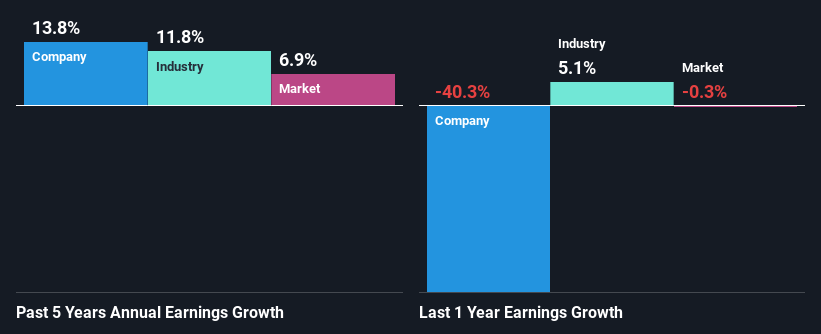Dajin Heavy Industry Co.,Ltd.'s (SZSE:002487) Stock Is Going Strong: Have Financials A Role To Play?
Dajin Heavy IndustryLtd (SZSE:002487) has had a great run on the share market with its stock up by a significant 7.3% over the last month. Given that stock prices are usually aligned with a company's financial performance in the long-term, we decided to study its financial indicators more closely to see if they had a hand to play in the recent price move. In this article, we decided to focus on Dajin Heavy IndustryLtd's ROE.
ROE or return on equity is a useful tool to assess how effectively a company can generate returns on the investment it received from its shareholders. In simpler terms, it measures the profitability of a company in relation to shareholder's equity.
Check out our latest analysis for Dajin Heavy IndustryLtd
How Is ROE Calculated?
The formula for ROE is:
Return on Equity = Net Profit (from continuing operations) ÷ Shareholders' Equity
So, based on the above formula, the ROE for Dajin Heavy IndustryLtd is:
4.7% = CN¥326m ÷ CN¥7.0b (Based on the trailing twelve months to June 2024).
The 'return' is the yearly profit. One way to conceptualize this is that for each CN¥1 of shareholders' capital it has, the company made CN¥0.05 in profit.
Why Is ROE Important For Earnings Growth?
We have already established that ROE serves as an efficient profit-generating gauge for a company's future earnings. Depending on how much of these profits the company reinvests or "retains", and how effectively it does so, we are then able to assess a company’s earnings growth potential. Assuming all else is equal, companies that have both a higher return on equity and higher profit retention are usually the ones that have a higher growth rate when compared to companies that don't have the same features.
Dajin Heavy IndustryLtd's Earnings Growth And 4.7% ROE
As you can see, Dajin Heavy IndustryLtd's ROE looks pretty weak. Even when compared to the industry average of 6.9%, the ROE figure is pretty disappointing. Although, we can see that Dajin Heavy IndustryLtd saw a modest net income growth of 14% over the past five years. We believe that there might be other aspects that are positively influencing the company's earnings growth. For instance, the company has a low payout ratio or is being managed efficiently.
As a next step, we compared Dajin Heavy IndustryLtd's net income growth with the industry and found that the company has a similar growth figure when compared with the industry average growth rate of 12% in the same period.

Earnings growth is an important metric to consider when valuing a stock. What investors need to determine next is if the expected earnings growth, or the lack of it, is already built into the share price. By doing so, they will have an idea if the stock is headed into clear blue waters or if swampy waters await. One good indicator of expected earnings growth is the P/E ratio which determines the price the market is willing to pay for a stock based on its earnings prospects. So, you may want to check if Dajin Heavy IndustryLtd is trading on a high P/E or a low P/E, relative to its industry.
Is Dajin Heavy IndustryLtd Efficiently Re-investing Its Profits?
Dajin Heavy IndustryLtd has a low three-year median payout ratio of 3.1%, meaning that the company retains the remaining 97% of its profits. This suggests that the management is reinvesting most of the profits to grow the business.
Additionally, Dajin Heavy IndustryLtd has paid dividends over a period of at least ten years which means that the company is pretty serious about sharing its profits with shareholders.
Summary
In total, it does look like Dajin Heavy IndustryLtd has some positive aspects to its business. Despite its low rate of return, the fact that the company reinvests a very high portion of its profits into its business, no doubt contributed to its high earnings growth. With that said, the latest industry analyst forecasts reveal that the company's earnings are expected to accelerate. Are these analysts expectations based on the broad expectations for the industry, or on the company's fundamentals? Click here to be taken to our analyst's forecasts page for the company.
Have feedback on this article? Concerned about the content? Get in touch with us directly. Alternatively, email editorial-team (at) simplywallst.com.
This article by Simply Wall St is general in nature. We provide commentary based on historical data and analyst forecasts only using an unbiased methodology and our articles are not intended to be financial advice. It does not constitute a recommendation to buy or sell any stock, and does not take account of your objectives, or your financial situation. We aim to bring you long-term focused analysis driven by fundamental data. Note that our analysis may not factor in the latest price-sensitive company announcements or qualitative material. Simply Wall St has no position in any stocks mentioned.
 Index Options
Index Options CME Group
CME Group Nasdaq
Nasdaq Cboe
Cboe TradingView
TradingView Wall Street Journal
Wall Street Journal